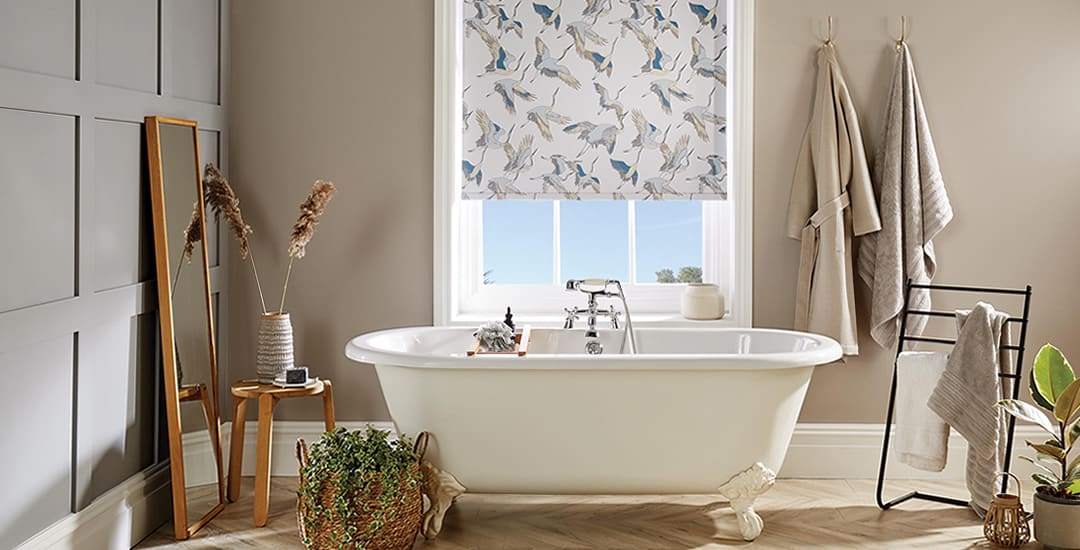
Do you need special blinds for bathroom windows? It’s certainly a good idea to choose waterproof blinds for bathroom windows in the vast majority of cases (the exceptions being in bathrooms that are huge, very well ventilated, and with windows far from anything that might splash them) but that’s about the only factor to consider.
You can get bathroom blinds – which essentially, just means blinds that are waterproof – in many different styles and finishes, including roller blinds, vertical blinds, and faux-wood blinds. There are also some types of blinds that are not and that cannot be made waterproof, which makes them a poor choice for bathrooms as a rule, including Roman blinds and real wood blinds respectively.
This blog post will answer some of our most frequently asked questions about blinds for bathrooms, including explaining what type of window blinds are ok for bathrooms and which to avoid.
Do you need special blinds for bathrooms windows, and why?
In terms of “special” in the context of bathroom blinds, waterproof blinds are strongly recommended for 99% of bathrooms, assuming that you want said blinds to reach the higher end of their potential lifespan in good working order and without looking (and potentially smelling) manky.
This leaves you with a lot of options when it comes to blinds types and also colours, finishes, and patterns, but also means that some blinds are off the table too.
Ironically, some of the blind types that aren’t going to live a long and fulfilling life in the average bathroom are those that we often think of as being “special” in terms of their prestige; like Roman blinds, which tend to be made of luxury fabrics that are definitely not waterproof, and day and night blinds, which are modern, funky, and absorb water like a sponge too.
Are roller blinds ok in bathrooms?
Yes, as long as they’re waterproof roller blinds, which means those made of either vinyl or PVC respectively. These are readily available to buy, and sold in a massive range of colours and styles.
However, not all roller blinds are waterproof; and the default or generic fabric used for roller blinds is polyester, which is not waterproof and so not always a good choice for bathrooms.
Can you get waterproof blinds that aren’t roller blinds?
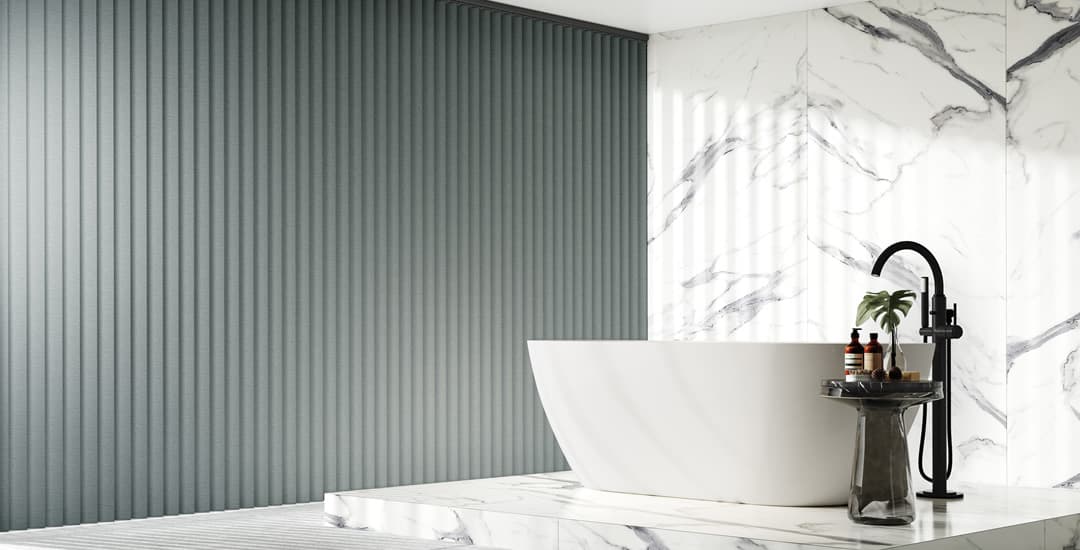
Waterproof roller blinds are definitely the most popular and common choice of bathroom blinds, and the blinds type that are available in the widest range of colours and styles too. They also tend to be the cheapest bathroom blinds to buy like-for-like as well.
Roller blinds aren’t your only option, however; so, can you get waterproof blinds that aren’t roller blinds?
Yep, there are a couple of options here. As well as waterproof roller blinds, you can also consider waterproof vertical blinds, and faux-wood blinds respectively. Both of these are totally waterproof and can deal with any amount of humidity or splashing without suffering as a result. As is the case with roller blinds, it’s important to note that not all vertical blinds are waterproof by default; these too come in a polyester option that is not bathroom-friendly, so check on the material mentioned on the product page before you buy.
There is also something of an on-the-fence option for bathroom blinds that probably aren’t a good choice for a bathroom that gets more humid than a tropical jungle when in use or that sees a lot of water flung about; but that will be fine in a moderately-sized bathroom that steams up to a degree, and that might involve the occasional but not regular splashing.
This takes the form of aluminium Venetian blinds; their slats themselves are waterproof, but their lift cords are porous/non-waterproof, which makes them unsuitable for exposure to high levels of moisture.
Do bathroom blinds go mouldy?
Do bathroom blinds go mouldy? This depends on whether or not they’re waterproof. If you use non-waterproof bathroom blinds and their fabrics get damp repeatedly and/or potentially never get the chance to dry out properly, over time this is apt to result in them hosting their own form of life.
Black mould, mildew, and fungus-based nasties of various other types I’ve seen but don’t have the names for tend to infiltrate the fabrics of non-waterproof blinds that get damp, which not only ruins their appearance and may cause a funky, dank smell in their vicinity, but can also result in the blind failing or falling apart faster than it otherwise would.
When it comes to bathroom-appropriate blinds, these are waterproof and so don’t harbour the moisture that permits mould and mildew to grow. They’re also often treated with a special mould/mildew resistant finish.
This means that it’s very uncommon for a waterproof blind to go mouldy or develop mildew, and this only really happens at all if the blind is always left in the same position without being opened and closed over the course of several years, so that condensation or damp collects in the blind’s creases and corners.
In the unlikely event that a waterproof blind does develop a film of mildew or mould regardless, this is no biggie; you can just wipe it clean away as the fabric of the blind itself doesn’t absorb water, and the spores of the lifeform in question won’t have infiltrated it.
Do you need blackout blinds in bathrooms?
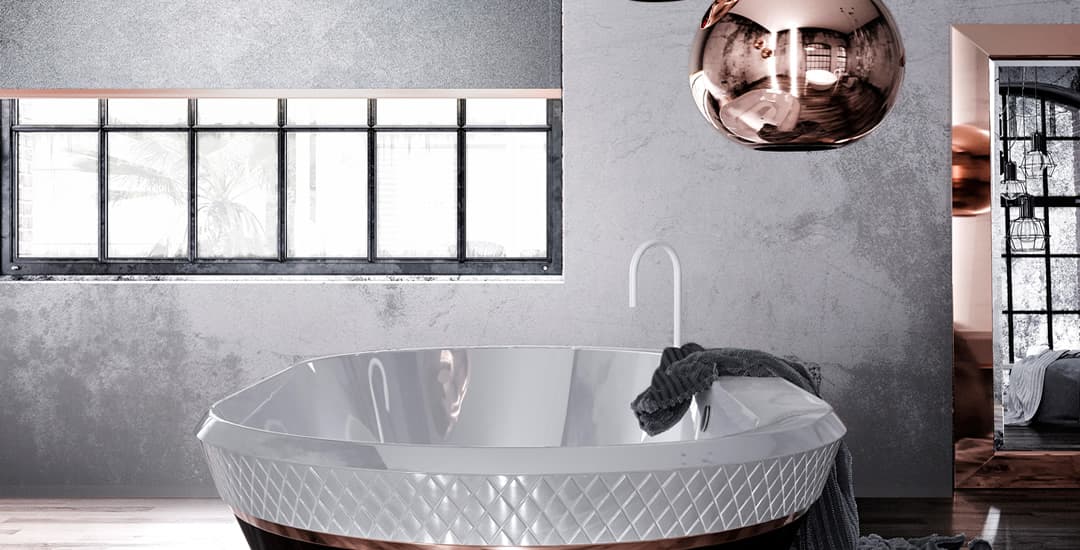
When people ask “do you need special blinds for bathroom windows,” they tend to be thinking in terms of tacking the challenges of being hung in a damp or humid environment. But in terms of protecting your modesty when in the tub or brushing your teeth, do you need blackout blinds in bathrooms?
Generally, bathrooms don’t need blackout blinds, in terms of said need meaning that without them, people would be able to see more of you than you and potentially, they would wish to.
Most bathroom windows are frosted or opaque; this does mean that people outside might see shapes and movement behind the glass if your lights are on, it’s dark outside, and you’re close to the glass, but this is rarely enough to offend either party’s modesty.
However, if this sort of level of exposure does make you feel uncomfortable, do you need blackout blinds in bathroom windows? Well, again probably not, as any old dimout blind when closed will usually obscure more or less wholly the sight of anything going on inside.
Even if your bathroom window is just plain glass, closed dimout blinds tend to mean that people outside can only at worst see obscured shapes and movement.
However, using a non-blackout blind in any window means that people outside will be able to see a level of light leakage from the bathroom and so, know that it is in use.
If you don’t like the idea of this, blackout blinds for bathrooms might be a good idea; and if you simply want to be able to bathe in full darkness or even ensure that opening the door to your en suite during the night doesn’t wake your sleeping partner by means of permitting light into the bedroom, blackout blinds might be on the cards too.
Essentially, whether or not you need blackout blinds for a bathroom depends on your preferences, and there’s no hard and fast rule that states that bathroom blinds must be blackout blinds, albeit we’d advise against very transparent or sheer blinds for this application for very obvious reasons!

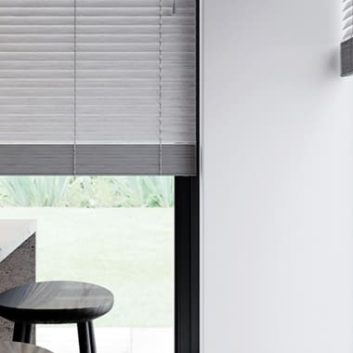
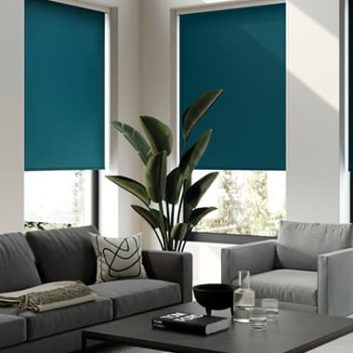
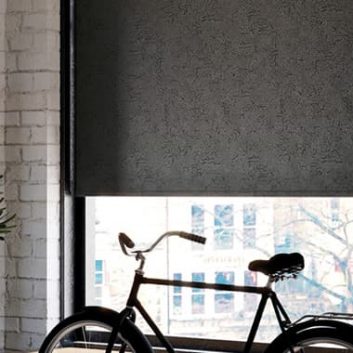
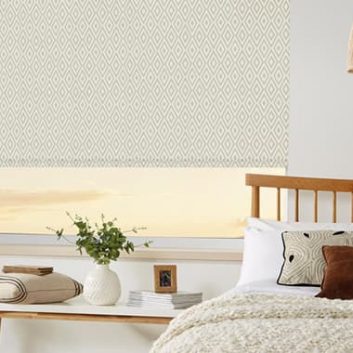
For a bath with a shower right next to a window is it best to have the waterproof blind inside or outside of the recess?
Thank you for your question. The only real advantage to having the blind fitted outside of the recess is you’re less likely to have moisture build up or settle on the windowsill, assuming the blind is down when the shower is on. Other than that, it’s largely down to personal choice as to whether you feel the blind looks nicer inside or outside the recess. They do tend to look neater fitted inside the recess in most settings, but again this can be down to personal preference.